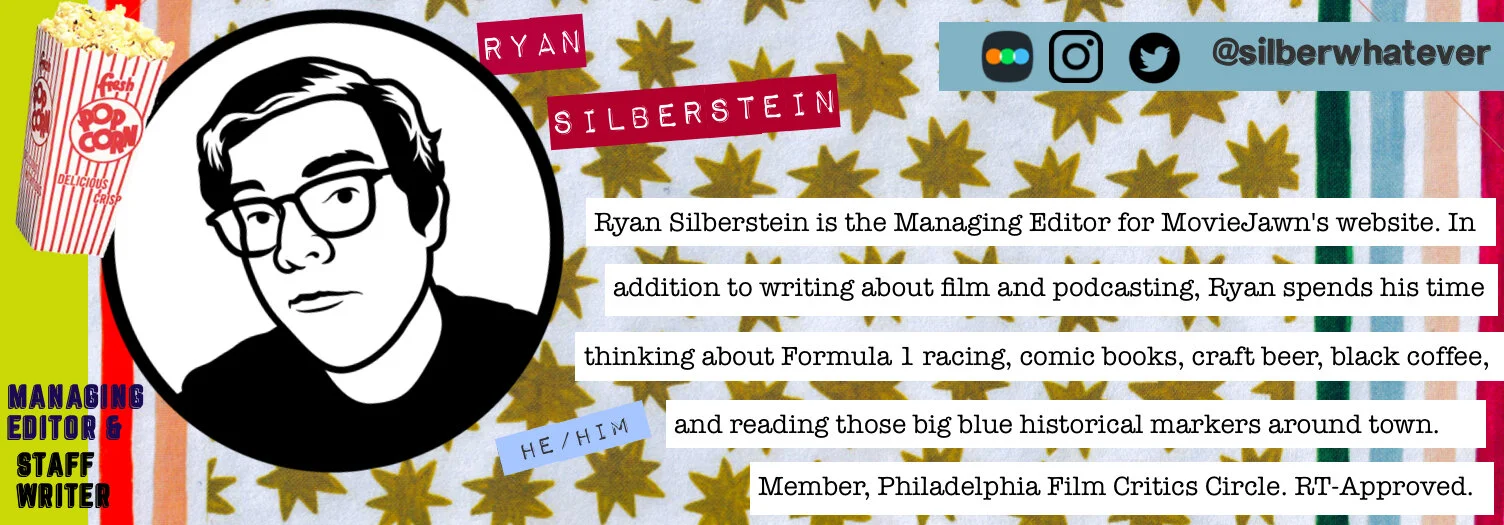SHANG-CHI and THE LEGEND OF THE TEN RINGS offers a whole new world to an established franchise
Written by Dave Callaham, Dustin Daniel Cretton and Andrew Lanham
Directed by Destin Daniel Cretton
Starring Simu Liu, Awkwafina, Tony Chiu-Wai Leung and Meng’er Zhang
Runtime 2 hours and 12 minutes
MPAA Rating PG-13 for sequences of violence & action, language
In theaters September 3
by Ryan Silberstein, Managing Editor & Staff Writer
Can you teach an established franchise new tricks? Unlike franchises with only one central concept (your Jasons, Freddys, Bonds, and Fasts/Furious), the Marvel Cinematic Universe (MCU) can continue to expand. While sometimes the Sacred Timeline of it all can make it feel weighed down by having to make sure each new piece fits into the preexisting storyline, there is a certain amount to be gained by having an established setting in which to introduce new characters. Shang-Chi and the Legend of the Ten Rings might be the best example of that so far. The first MCU movie or television show to be fully free of the “Infinity Saga,” means that Shang-Chi can jump into the established world, introduce new stuff, and not be obligated to build up to anything specific.
Director Destin Daniel Cretton (Short Term 12) shares writing credit for Shang-Chi with Dave Callaham, and looking at the full list of films, the ones where the director has a writing credit often seem to float to the top of my personal MCU ranking. James Gunn, Ryan Coogler, and Shane Black are among those, and the projects where the director was involved in the script feel more personal than many of the others. Story-structure wise, Shang-Chi has a lot in common with Black Panther, Thor, and Doctor Strange. These origin story movies often rely on a simple formula that follows the first segment of the monomyth, with the hero answering a call to adventure, gaining a supernatural boon by traveling into an unknown world, and returning a hero. Shang-Chi does just that.
We meet Shaun (Simu Liu) working as a parking valet in San Francisco with his friend Katy (Awkwafina), both of them happily going nowhere. When Shaun’s martial arts training is revealed during an attack by assassins, they travel to China to reconnect with his sister Xialing (Meng'er Zhang) while avoiding their father, Wenwu (Tony Leung). There’s a lot of exposition and extensive flashbacks in Shang-Chi, which interrupts the film’s flow a bit too often, and results in any attempt to describe the plot being a wasted exercise without spoilers. What I appreciated most about Shang-Chi were the action and who was telling the story.
First, while supposedly the MCU is an action franchise, they rarely function as such. They’re more like friendship dramas with some occasional effects work. When I think of Avengers: Endgame, I think of the Hulk handing Paul Rudd a new taco among a dozen other character beats before I think about fight choreography. The characters in Shang-Chi are great (more on that shortly), but this movie stands out from the rest of the Marvel pack when it comes to action. The choreography is excellent, but even more than that, the staging of the many chase-and-fight sequences heavily draw on Jackie Chan’s work to bring a sense of characters who think on their feet, underlining the improvised feel they are aiming toward. It gives the entire movie a distinct feel compared to other MCU entries, at least until the final act, which is fun in its own right, but feels a bit more same-old-Marvel than the rest of the movie.
Spending time with these characters is enjoyable throughout the movie, and their likability gives it a fast-paced feel, even with the repeated stopping for backstory. I continue to enjoy Awkwafina, and thankfully, she gets a bit more to do plotwise than most quippy sidekicks, which is a big win. It would be easy to undervalue Simu Liu’s performance as another vanilla hero character, but he brings an interesting combination of wisdom and youth to the role that stands atop his character’s secret past. Additionally, seeing Michelle Yeoh pop up (in her second MCU role) is always a delight, especially when it metatextuality ties Shang-Chi into Crouching Tiger, Hidden Dragon as Western works that draw heavily on the wuxia genre and approach it from an Asian-American perspective.
But then there’s Tony Leung. His character, Wenwu, carries the Ten Rings, which have given him long life and a legendary status that befits the actor as well as the character. The character is one that is defined by loss and tragedy, a man that tried to give up power but was ultimately broken by the cost of doing so. Leung brings him to life with the same nuance as his work with Wong Kar-Wai, Ang Lee, John Woo, and others. Wenwu is motivated primarily by loss, rather than revenge or power lust. He is a devoted husband, though was incapable of being a warm father figure. Leung portrays him as someone desperate for control, and having the means as well as the will to do whatever he can to restore what he has lost. Leung elevates the character from sympathetic villain to tragic figure, acting as a counterbalance to the otherwise light tone. This is the exact reason you cast living legends and the gravitas they can bestow genre blockbusters.
Shang-Chi and the Legend of the Ten Rings shows how strong the Marvel storytelling structure is. With a new world opening up here, it is easy to see how drawing on other genres and incorporating more points of view in the creative process is all the familiar formula needs to feel fresh enough to warrant spending another two hours in this universe.



